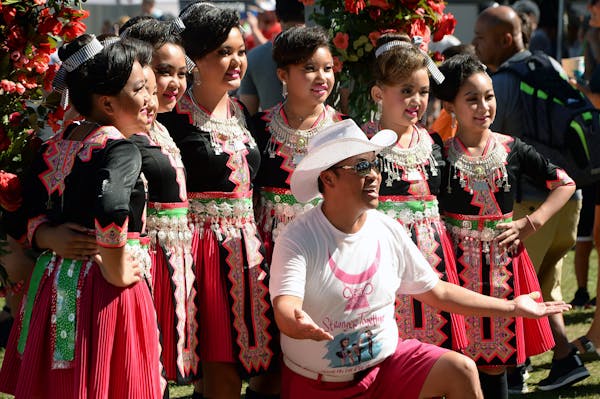Tou Ger Xiong composed a poem amid the COVID-19 pandemic's onslaught in 2020. In it, he mused about the prospect of dying alone in a hospital.
"Did I say all that I had to say?" wrote the longtime entertainer and esteemed Hmong-American activist from St. Paul.
Nothing, he added, could "compare to the fear of dying, alone, away from family, with unfinished business, and unspoken words."
Xiong's words echoed inside a Woodbury high school gymnasium Saturday as mourners gathered to remember a prolific life brutally ended by kidnappers in Colombia this month.
"I'm still in shock, mainly because he died so far away from us," said KaYing Yang, a St. Paul entrepreneur and social justice advocate.
Saturday's vigil, Yang said, marked the first step for a reeling community to celebrate Xiong's positive contributions rather than reflect on his life's violent end.
Xiong, 50, was one of 11 children in a family that fled its native Laos amid warfare in 1973. The family spent four years in a refugee camp in Thailand before settling in St. Paul. The Humboldt High School and Carleton College alum later toured the country as a motivational speaker, blending rap and comedy into his storytelling.
Xiong's fingerprints were also on the first Hmong Minnesota Day held at the Minnesota State Fair in 2015, and he was credited with helping Mee Moua become the nation's first Hmong American elected to a state legislature in 2002. Xiong, Sen. Amy Klobuchar said Saturday, "made the most of his tragically short time here on Earth."
Xiong was killed this month in Medellin, Colombia, after being kidnapped following a date, according to local press reports in Colombia. Kidnappers reportedly stabbed and beat Xiong to death a day later without collecting the money.
Lt. Gov. Peggy Flanagan, Attorney General Keith Ellison and St. Paul Mayor Melvin Carter were also among those to remember Xiong on Saturday.
Eh Xiong, an older brother to Tou, closed the vigil by reciting his brother's May 2020 poem that pondered a lonely end. That same poem included a message for Xiong's "spiritual children," described as all of those he taught or entertained.
"Smile when you think of me, for I'm smiling because I thought of you," he wrote.

Want to share info with the Star Tribune? How to do it securely

'Safe recovery sites' would offer syringes, naloxone and more to people using drugs. The plan could be in peril.
New Minnesota GOP leaders seek peace with party's anti-establishment wing

Who is Republican Lisa Demuth, Minnesota's first House speaker of color?

